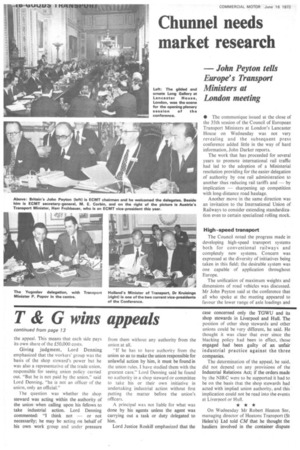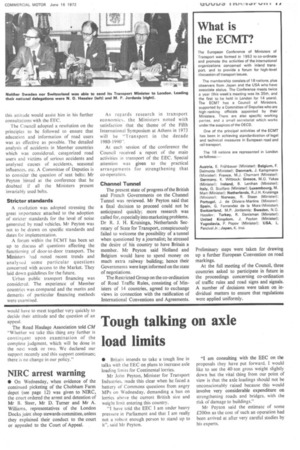Chunnel needs market research
Page 18

Page 19

If you've noticed an error in this article please click here to report it so we can fix it.
John Peyton tells Europe's Transport Ministers at London meeting
• The communique issued at the close of the 35th session of the Council of European Transport Ministers at London's Lancaster House on Wednesday was not very revealing and the subsequent press conference added little in the way of hard information, John Darker reports.
The work that has proceeded for several years to promote international rail traffic had led to the adoption of a Ministerial resolution providing for the easier delegation of authority by one rail administration to another thus reducing rail tariffs and — by implication — sharpening up competition with long-distance road haulage.
Another move in the same direction was an invitation to the International Union of Railways to consider extending standardization even to certain specialized rolling stock.
High-speed transport
The Council noted the progress made in developing high-speed transport systems both for conventional railways and completely new systems. Concern was expressed at the diversity of initiatives being taken in this field; the desirable system was one capable of application throughout Europe.
The unification of maximum weights and dimensions of road vehicles was discussed. Mr John Peyton said at the conference that all who spoke at the meeting appeared to favour the lower range of axle loadings and this attitude would assist him in his further consultations with the EEC.
The Council adopted a resolution on the principles to be followed to ensure that education and information of road users was as effective as possible. The detailed analysis of accidents in Member countries which was considered, categorized road users and victims of serious accidents and analysed causes of accidents, seasonal influences, etc. A Committee of Deputies is to consider the question of seat belts: Mr Peyton hinted at the conference that he doubted if all the Ministers present invariably used belts.
Stricter standards A resolution was adopted stressing the great importance attached to the adoption of stricter standards for the level of noise generated by road vehicles. Mr Peyton was not to he drawn on specific standards and dates for implementation.
A forum within the ECMT has been set up to discuss all questions affecting the functioning of door-to-door transport. The Ministers had noted recent trends and analysed some particular questions concerned with access to the Market. They laid down guidelines for the future.
Urban public transport financing was considered. The experience of Member countries was compared and the merits and demerits of particular financing methods were examined.
As regards research in transport economics. the Ministers noted with satisfaction that the theme of the Fifth International Symposium at Athens in 1973 will be "Transport in the decade 1980-1990-.
At each session of the conference the Council received a report of the main activities in transport of the EEC. Special attention was given to the practical arrangements for strengthening that co-operation.
Channel Tunnel The present state of progress of the British and French Governments on the Channel Tunnel was reviewed. Mr Peyton said that a final decision to proceed could not be anticipated quickly; more research was called for, especially into marketing problems. Dr R. J. H. Kruisinga, Netherlands Secretary of State for Transport, conspicuously failed to welcome the possibility of a tunnel when questioned by a journalist; he stressed the desire of his country to have Britain a member. Mr Peyton said Holland and Belgium would have to spend money on much extra railway building; hence their Governments were kept informed on the state of negotiations.
The Restricted Group on the co-ordination of Road Traffic Rules, consisting of Ministers of 14 countries, agreed to exchange views in connection with the ratification of International Conventions and Agreements. Preliminary steps were taken for drawing up a further European Convention on road markings.
At the full meeting of the Council, three countries asked to participate in future in the proceedings concerning co-ordination of traffic rules and road signs and signals. A number of decisions were taken on individual matters to ensure that regulations were applied uniformly.




























































































